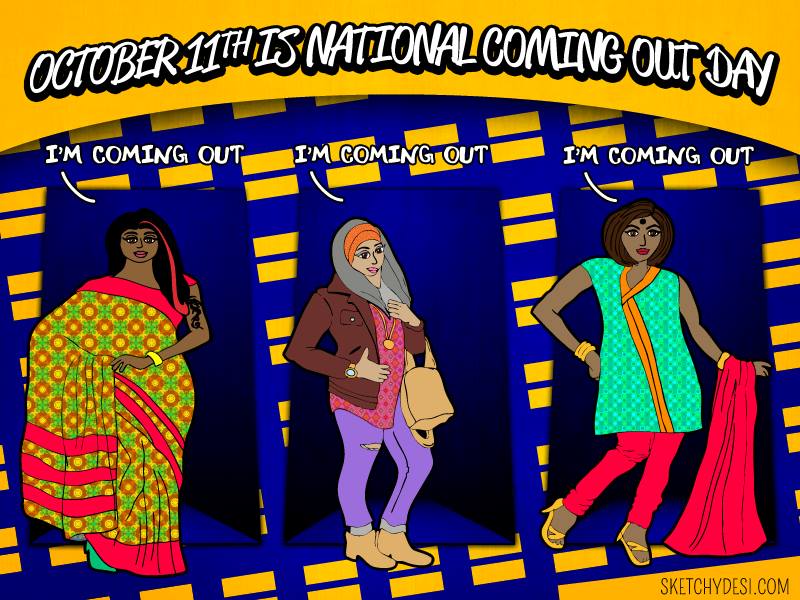
October 11 marks the country’s annual National Coming Out Day. Mainstream LGBTQ organizations such as the Human Rights Campaign tout this day as an empowering and proud way to celebrate the freedom to be out and open about who we are and all the genders we love.
While successful in this purpose, for members of the South Asian community, coming out is a concept that doesn’t always fit in with the mainstream narrative: coming out to families, parents, and the community at large remains unsafe for many minorities, and isn’t something as simple as looking at HRC’s Coming Out Guide. The shame and stigma around topics of gender and sexuality not only make embracing ourselves harder, it makes navigating our worlds as our full selves a never-ending game.
[Read Related: After Orlando: Where Does Safety Exist for LGBTQ People of Color]
No one’s experiences are the same, and it’s not to say that coming out is any less pivotal or important for South Asians. But in a lot of ways, each of us who have had the privilege of coming out must acknowledge our journey, that of those before us, and pave the way for those after us.
Coming out isn’t for everyone, and there’s no one way to do it. Here’s a glimpse of what coming out means to a few (might I say awesome) brown folks.
 By Fawzia Mirza
By Fawzia Mirza
Actress, writer, and producer
Coming out has been such a powerful part of being a South Asian, Muslim, queer and lesbian-identifying woman. At least for me. BUT, when I think about that phrase, ‘Coming Out’, it was definitely coined by someone who never had South Asian parents. Because, as a brown girl, I think about all the things I have NOT come out about. STILL. I have not come out about the fact that I may have dined on swine (It was in New Orleans and the gumbo was so so good!) I have NOT come out about the fact that I like mimosas. (They’re great at brunch!) I haven’t come out about the fact that I wear a bikini (sorry, mom!). And I have not come out about the fact that I don’t care about being fair and lovely because I feel much better when my face is sun-kissed and full of all the Vitamin D (it’s good for us!). Okay, that last one my mom may have noticed. Regardless, I think we can all relate to how hard it is to talk about certain issues with our family members. So, on National Coming Out Day, go tell your LGBTQIA friend how much you love them and you’re proud of them. Cause coming out can be real hard.
 By Almas Haider
By Almas Haider
Storyteller and culture worker
My first thought after coming out to myself was that I would never tell my parents. I had no conflicts with that decision. I knew they would never accept me. Not when their only other child was also gay. Coming out to myself meant accepting that I would not have parents or a family in the way others do. And that I would also have to fulfill the dreams they had as Pakistani working class immigrants who continue to survive in a country that brutalizes and targets Muslims, and other people of color.
Over the next several years I made personal and professional choices that took me all over the U.S. and the world. The life my parents believed I was living was one where I would work and come home, occasionally socializing and sometimes protesting on the streets. Hiding my queer identity, something so central to my politics, led me to hide all parts of my identity from them, including being a community worker, storyteller, organizer, and advocate for people who are marginalized. I used the distance between me and my parents, limited communication, and minimal physical time together as an unspoken coping mechanism to handle my growing depression I denied existed. It would manifest in unhealthy and unsafe ways, as it does for so many of us living multiple lives.
In the last year, I reached a breaking point. I began to acknowledge that I needed the release of disclosing to my parents I am queer. So I began to prepare to say goodbye to what little connection I had to them and acknowledge that because of their old age and stress of having one queer child, that I could actually kill them by telling them the truth about me.
While their initial response was acceptance, we have continued to have difficult conversations related to my queer identity. It was a risk in many ways, a privilege that not everyone has the option of doing given safety, financial ties, existing power dynamics, etc. But it has also enabled me to create a new relationship with my parents in which they know all of me, which at my point in my journey I needed.
 Priya Arora is a queer-identified community activist, writer, and student. Born and raised in California, Priya has found a home in New York City, where she is currently pursuing a Master’s degree in Counseling Psychology at Teachers College, Columbia University. Priya’s passion and research lies in capturing and fostering the needs and experiences of South Asian American LGBTQ people, with a mental health focus.
Priya Arora is a queer-identified community activist, writer, and student. Born and raised in California, Priya has found a home in New York City, where she is currently pursuing a Master’s degree in Counseling Psychology at Teachers College, Columbia University. Priya’s passion and research lies in capturing and fostering the needs and experiences of South Asian American LGBTQ people, with a mental health focus.




